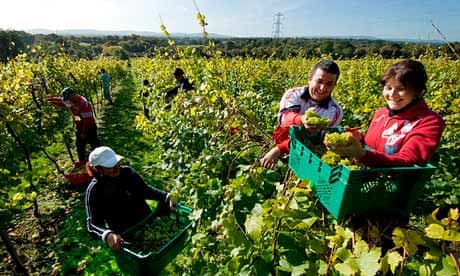The rise of Ukip is having unexpected consequences for Britain's countryside. Farmers fear that the political upstart's success has the government running scared on immigration, with the result that foreign workers could soon be absent from Britain's fields.
"We can see there's a toxic mix brewing," says Alastair Brooks, who employs 200 temporary foreign workers to pick strawberries and raspberries at Langdon Manor Farm in Faversham, Kent. "People have understandable concerns about immigration, but temporary migrant workers have got tied up in the debate," he said.
Brooks has 130 acres of his farm devoted to fruit. Without foreign workers, he says, he will have to cut production. Many other farmers are in a similar position, says the National Farmers Union, because they fear that without foreign workers they will not have the staff to do the job.
It is not an idle concern. A shortage of foreign workers in 2007 and 2008 resulted in crops being left unharvested. Since then, the seasonal agricultural workers' scheme (Saws), which supplies about a third of the sector's temporary labour, has been open only to Romanians and Bulgarians. However, at the end of this year, both countries' citizens will gain full access to the EU job market. There are concerns that many of the 21,500 on the Saws scheme – which was established after the iron curtain came down to help the families of Polish and Czech servicemen unable to return home – will look for permanent jobs rather than seasonal work.
However, Brooks questions whether many will even come to the UK once the restrictions are lifted, given that their countries are closer to a booming Germany mode. For this reason, the NFU warns that finding a successor to Saws is now critical if the UK's £3.1bn horticulture industry is going to thrive. The union's concerns are echoed by the government's migration advisory committee (Mac), which has warned that a shortage of seasonal migrant labour would lead to a 10% to 15% rise in supermarket prices.
But food inflation is the least of the fruit growers' concerns. Brooks believes that supermarkets would source from abroad rather than risk food inflation. Countries such as Poland or France – and even the US – would be the beneficiaries, he says. Under this scenario, East Anglia's salad industry would move to Hungary, the asparagus industry would struggle to maintain production and many recent horticultural successes would be reversed.
"The Kent apple industry was on its knees and now it's coming back because they've got the workforce," Brooks says. His own industry – worth almost £1bn a year to the UK – would suffer dramatically. In 1988, when he started fruit farming, about 60% of strawberries consumed in the UK were imported. Today almost three quarters are homegrown. His concerns are shared by most farmers in his industry. An NFU survey found that more than 95% of growers who used Saws last year believed the end of the scheme would have a negative impact on business.
Finding employees locally is difficult because British workers are not interested in fruit-picking. Of the 25 non-Romanian and Bulgarian applicants who recently expressed an interest in picking fruit on Brooks's farm, 20 were British and five were Polish. By the end of the week, only the Poles remained. The early start times, the weather and the hard work involved seems to put many Britons off. "It's understandable; British workers are looking for more permanent jobs," Brooks said.
The NFU has made tentative suggestions about hiring former prisoners and called on the government to follow Spain and allow benefit claimants to work on a daily call basis without losing entitlements. There are hopes that new EU accession countries such as Croatia will be able to fill the gap, but it has a population of only 4.4 million and is relatively prosperous.
The migration advisory committee suggests that, ultimately, the government may have to allow workers from other non-EU countries such as Russia or Ukraine and Ukraine. However, this would play badly with voters now that Ukip has made immigration a major political issue, and the Home Office appears to be cool on the suggestion. "We shall consider the Mac's advice very carefully. However, in general we want to encourage employers to recruit from the resident labour market where possible," a spokesman said.
The NFU says that ending Saws would be bad for British jobs. For every 3.5 jobs created by Saws another is created for a British worker. But all this hangs in the balance.
Fruit farmers such as Brooks have to make hiring decisions a year ahead. They will soon have to decide whether to curtail their operations, something that would deal a major blow to the government's ambitions to make half of the fruit consumed in the UK grown domestically.
Last Thursday morning, Brooks drove his battered Land Rover around fields that have been farmed since the 14th century. Young Bulgarian and Romanian workers, seemingly oblivious to the unseasonal chill of the British spring, worked under the protection of polytunnels. The tunnels come down in November. Brooks has no idea how many will go up again next year.






